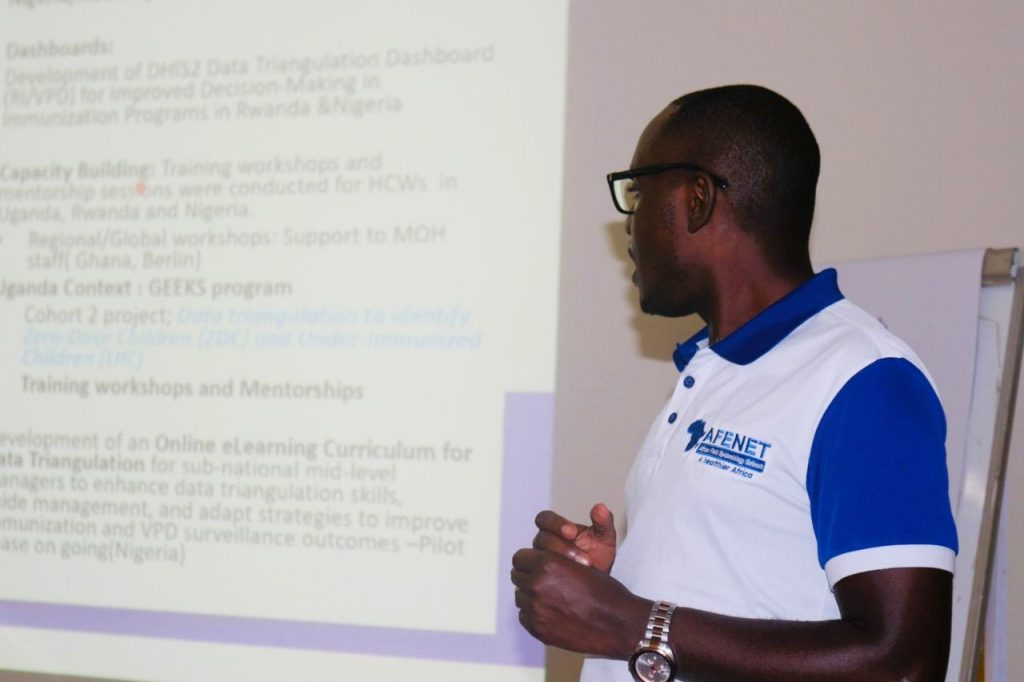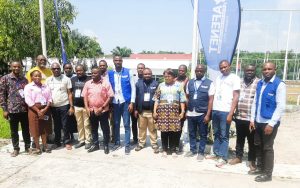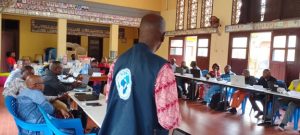AFENET and partners evaluate CDC Data Triangulation Activities to strengthen immunization and VPD surveillance in Uganda (2022–2025)
-
by
AFENET


As part of its commitment to advancing data-driven public health decision-making, the African Field Epidemiology Network (AFENET), in collaboration with the U.S. Centers for Disease Control and Prevention (CDC) and the Uganda Ministry of Health (MOH), convened an Orientation Workshop for the upcoming evaluation titled: “Assessment of CDC Data Triangulation Activities to Enhance Immunization and Vaccine-Preventable Disease (VPD) Surveillance Programs in Uganda (2022–2025).”
The two-day workshop from 10 -11 November 2025 at the Kampala Nile Resort Hotel, Namanve, brought together key stakeholders from the Ministry of Health, CDC, AFENET, and partner organizations involved in immunization and surveillance. The event aimed to orient participants on the evaluation objectives, methodology, and expected roles, while fostering shared understanding and collaboration.
The workshop also provided a forum to reflect on past and ongoing CDC-supported and MOH data triangulation activities, share lessons learned, and explore strategies for integrating triangulation into Uganda’s routine immunization and VPD surveillance systems.
Delivering the welcome remarks, Dr. Kevin Mugenyi, representing AFENET, commended the collaboration between AFENET, CDC, and the Ministry of Health, emphasizing that the initiative exemplifies the organization’s core mission strengthening public health systems through evidence-based action.
Dr. Mugenyi noted that AFENET’s long-standing partnership with CDC under the Growing Expertise in E-Health Knowledge and Skills (GEEKS) program has helped build capacity in data management, analysis, and use for immunization program improvement.
“Through this evaluation, we reaffirm our commitment to working with government and partners to enhance data use for better immunization outcomes,” Dr. Mugenyi remarked.
“Triangulation enables us to connect the dots between multiple data sources, helping decision-makers act faster and smarter.”
His remarks set a positive and collaborative tone for the workshop, highlighting AFENET’s leadership role in strengthening data systems across Africa.
Priorities for Data Use: Aligning with MOH, EPI, IES & PHE
A key session of the workshop focused on how data triangulation aligns with national priorities under the Ministry of Health’s Expanded Programme on Immunization (EPI) and the Integrated Epidemiology, Surveillance & Public Health Emergencies (IES&PHE) framework.
Discussions emphasized that data use is central to Uganda’s health priorities, specifically in:
- Promoting evidence-based decision-making at all levels
- Strengthening coordination between immunization and surveillance data systems
- Enhancing early detection, rapid response, and monitoring of VPDs
- Institutionalizing data triangulation as a tool for program performance improvement
Participants acknowledged that triangulation is an essential step toward ensuring that every data point informs action from national policy formulation to district-level service delivery.
The official opening remarks were delivered by Mr. Albert Besigye, representing the Ministry of Health (EPI, Surveillance & Data Division).
Mr. Besigye commended AFENET and CDC for their consistent technical support to the Ministry and reiterated the government’s commitment to strengthening data systems for immunization and disease surveillance.
“Our progress in immunization and VPD surveillance depends on how effectively we use data,” Mr. Besigye stated. “Data triangulation offers a clear pathway for identifying performance gaps, improving coordination, and ensuring that decisions are guided by reliable evidence.”
He emphasized that the evaluation aligns with MOH’s broader goal of integrating data triangulation into routine program management, thereby enhancing responsiveness, accountability, and impact.
Since the release of the Global Data Triangulation Guidance, CDC has supported several countries in adopting triangulation to improve immunization data use.
In Uganda, these efforts have been implemented through AFENET’s GEEKS Program, in partnership with MOH/UNEPI, to build local capacity for data-driven immunization decision-making.
Key achievements include:
- National and sub-national training workshops
- Development of customized triangulation dashboards and tools
- Continuous mentorship and technical support for data analysis and interpretation
These initiatives have enhanced data visibility and the culture of data use at national and sub-national levels.
About the Evaluation
AFENET has received approval from the Uganda National Council for Science and Technology (UNCST) to conduct this evaluation, which will assess:
✅ Successes, challenges, and innovations from CDC-supported triangulation activities
✅ Enabling factors that facilitate integration into routine systems
✅ Best practices and lessons learned to guide future immunization and surveillance data use
Findings from this evaluation will inform the Ministry of Health, CDC, and partners on how to strengthen data triangulation practices to support evidence-based planning and policy development.
Driving Collaboration for Sustainable Impact
The workshop reaffirmed AFENET’s dedication to strengthening partnerships and fostering learning across public health networks. By aligning triangulation with national EPI, IES, and PHE priorities, AFENET and its partners are helping Uganda build resilient, data-informed health systems that respond effectively to immunization and surveillance challenges.
“Data is only powerful when it is used,” Dr. Mugenyi reminded participants.
“Together, we can transform data into insight and insight into action to protect every community from vaccine-preventable diseases.”





